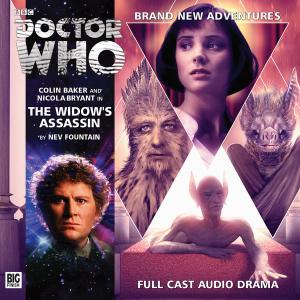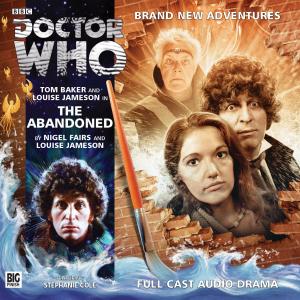Doctor Who The Widows Assassin

The Widow’s Assassin
Written By: Nev Fountain
Directed By: Ken Bentley
Cast: Colin Baker (The Doctor), Nicola Bryant (Peri), Tim Chipping (Constable Wolsey/Mandrake), John Banks (Baron Pteratrark/Guard Two), Andrew Dickens (Reverand Flitamus/Guard One), FIona Sheehan (Princess Dirani), Glynn Sweet (Harcross The Ever-Patient/Pheen-Tu/Flunkey)
Released October 2014
“The thing is, Peri, I always go back ... for my friends. In time, I always go back ...”
The Doctor, The Widow’s Assassin
The Widow’s Assassin seeks to definitively address a question that has gone largely unanswered for nearly 30 years: What really happened to the Sixth Doctor’s erstwhile young American companion Perpugilliam Brown after their visit to Thoros-Beta?
When we last saw Peri (Nicola Bryant) on television in part eight of 1986’s epic, season-long serial The Trial of a Time Lord, it appeared that she had died on Thoros-Beta. In what must have been an even more confusing situation for the young woman, Peri had beforehand been seemingly betrayed and abandoned by the Doctor (Colin Baker). However, in what many fans nearly three decades on still consider a dreadful copout, it was later revealed that Peri’s life had been spared and she had become the queen of the Krontep warrior King Yrcanos. Even comforted by the knowledge Peri was still alive, it seems the Doctor never went back for her on-screen – or at least never attempted to reconcile with her.
Indeed, it has been left up to lots of spin-off and fan fiction over the years to speculate about Peri’s ultimate fate, sometimes ranging from the tragic to the absurd. Baker himself even had a go in his 1994 Doctor Who Magazine graphic novel The Age of Chaos. Writer Nev Fountain, best known for TV’s Dead Ringers and various other Doctor Who audio contributions for Big Finish, offered his own heartbreaking take on Peri in the Doctor Who Companion Chronicle Peri and the Piscon Paradox (2011). However, the most absurd theory came from Philip Martin, the scriptwriter of parts five to eight of Trial, who suggested in the 1989 novelisation of his script that rather than becoming a queen, Peri was safely returned to Earth and became Yrcanos’ manager on the US pro-wrestling circuit!
Now Fountain, who is actually married to Nicola Bryant, has had a go at definitively resolving Peri’s story (presumably with Bryant’s input) with The Widow’s Assassin. After nearly 30 years, has it been worth the wait, you may ask? And is it any better than some of the speculation that we’ve been served up over the years?
Fountain answers these questions by putting to us another: Yes, we know the fair maiden was ultimately rescued and became a queen – but was it ever truly that simple? On one level, Fountain’s tale is plausible, and he draws on the apparent fairy tale aspects of Peri’s fate to illustrate that perhaps it wasn’t all sweetness and wine after all (the opening monologue to the story is especially memorable). On the other hand, there are some elements of the story that just aren’t executed as well as they ought to be and really place a lot of blind faith in the listener’s conviction.
The tale start offs as a relatively straightforward murder mystery in a pseudo-mediaeval setting on Krontep. The Doctor arrives on the day of Peri’s wedding to Yrcanos to beg her forgiveness and to try to understand why she never waited for him on Thoros-Beta after he was whisked away to his trial. However, Peri has him promptly arrested and thrown into prison. Yrcanos is poisoned at his own wedding and dies a week later (fans who still cringe at Brian Blessed’s shouting nearly three decades on can breathe a huge sigh of relief – Yrcanos is only mentioned in dialogue and their sensitive ears are spared Blessed’s booming tones!). Five years later, Queen Peri pardons the Doctor and enlists him on a diplomatic mission to the planet Hurn to observe the suitors for the nuptials of its ruler Princess Dirani (Fiona Sheehan), only for the Time Lord to again fall foul of the law and be accused of regicide ...
The mediaeval flavour of The Widow’s Assassin gives the listener a story that is (much like Fountain’s period drama The Kingmaker) more farce than drama – or more Blackadder than Game of Thrones! It features many colourful, exaggerated characters with ridiculous and snobbish accents such as Baron Pteratrark (John Banks), Reverend Flitamus (Andrew Dickens) and Prince Harcross the Ever Patient (Glynn Sweet), as well as the distinctly Welsh working class intonations of the simply named Guard One and Guard Two (Dickens and Banks again), who fulfil similar roles to the fools of many Shakespearean epics. Indeed, the only no-nonsense character, apart from the Doctor and Peri, is the Queen’s head of security Constable Wolsey (Tim Chipping) – and even he is a genetically modified human-sheep hybrid! Apparently having four stomachs gives Wolsey an extra “gut feeling” when solving crimes!
The story also parodies fairy stories, particularly of the beautiful princess bagging her wonderful prince at the end of the story – although in the case of The Widow’s Curse, we discover that not all royal personages necessarily live happily ever after, nor they know true love either!
In addition to straddling the fairy tale, pseudo-mediaeval and murder mystery genres, The Widow’s Assassin to boot throws in a “wibbly, wobby, timey-wimey” element. This was a strong feature of Fountain’s Peri and the Piscon Paradox and also of The Kingmaker but the “timey-wimey” component in The Widow’s Assassin is subtler and requires not only a lot of exposition but an open mind on the listener’s part to make it credible (something that the author should make work of his own accord, not anticipate the listener to accept). It does, however, explain why the Doctor is supposedly content to spend time in prison rather than investigate Yrcanos’ murder.
While The Widow’s Assassin is mostly satirical, the cliffhanger to part two of this four-part serial takes the story in a more sinister and abstract direction from what you’re expecting and it ceases to be your conventional murder mystery. In fact, the story has a twist within a twist, completely overturning the usual assumptions we have had about Peri’s fate after life in the TARDIS and really testing the story’s plausibility and again the listener’s ability to suspend disbelief. Unfortunately, the antagonist, which is revealed to have as much of a personal connection to the Doctor as Peri herself, is “too grotesque to be real” (as the Sixth Doctor once said of another of his foes) – that is, the adversary is even more two-dimensional and underwhelming than intended (a fact not helped by the over-synthesised voice!). Fountain tries to be a little too clever with his script when he doesn’t need to be.
Nevertheless, the production itself is delivered with all the energy and enthusiasm that we have come to expect from the cast and crew of a BF audio production and, apart from sections which require a lot of ponderous exposition, the story is well paced and well performed by the cast. It is a credit to the likes of Chipping, Banks, Dickens and Sweet that they can deceive the ear with differing voices and inflections and create the impression that there are more actors involved in the production than there actually are. Indeed, all the actors, including the regulars, should be congratulated for fantastic voice work. Baker and Bryant even swap roles in the climactic stages of the story (Bryant’s portrayal of the Doctor is brilliant and Baker’s impersonation of Peri’s American accent is riotously funny!). Baker even lends his voice to other roles; the reason why makes sense as the story progresses (despite again testing the listener’s credulity) but you do not realise it is Baker’s voice until you sit through repeated listenings.
For the most part, The Widow’s Assassin is an entertaining, farcical romp with plenty of black humour but as a definitive resolution to Peri’s fate in the Doctor Who universe, it really should have been a more earnest, darker story – much like the Thoros-Beta story arc of the Trial season which inspired it in the first place. Indeed, you expect the story to be much darker after the great cliffhanger to part two; Fountain sets up what seems to be an intelligent, logical follow-on from events on television but then attempts to be too clever and fancy with it and expects far too much of the listener to accept some of his plot points and join the dots. Nevertheless, if you’re a fan of Peri Brown (and Nicola Bryant) and were always disappointed at the uncertainty of her departure, you will now be pleased that the character has effectively been given a new lease of life (pun not necessarily intended!) and that she may yet have more satisfactory closure in BF’s ongoing Doctor Who audio range than she did on television.









